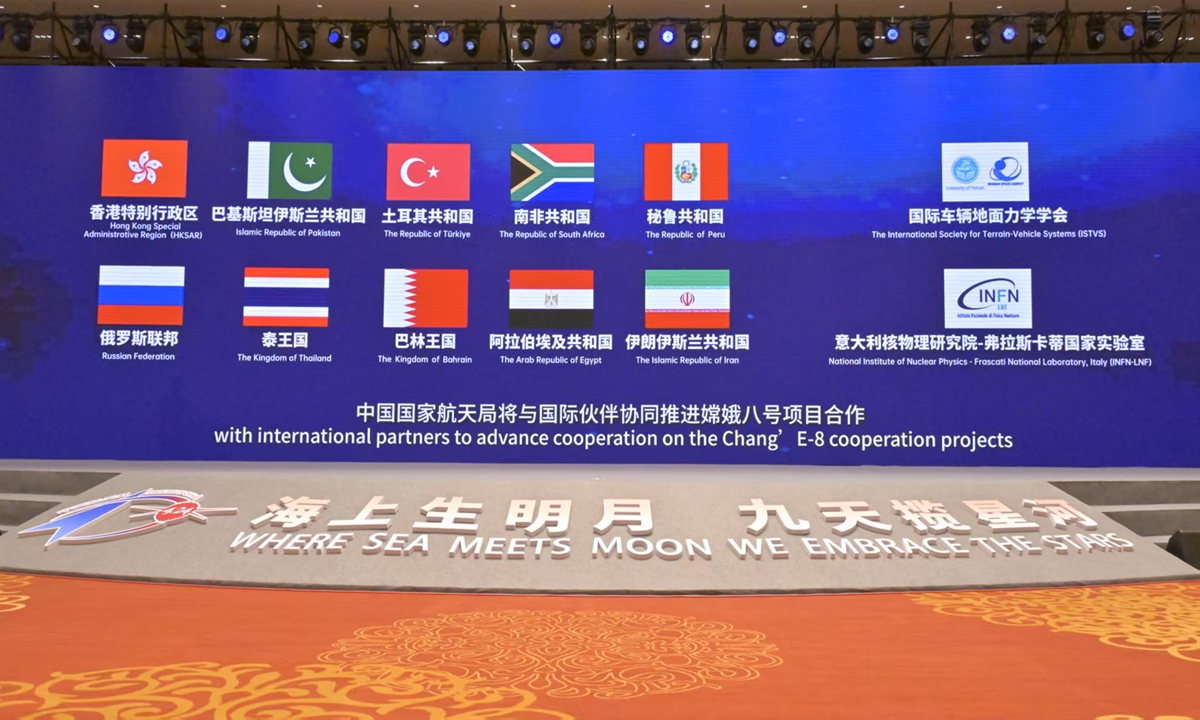CNSA unveils 10 selected international cooperation projects for Chang’e-8 lunar probe mission

CNSA unveiled Chang'e-8 international cooperation projects on April 24, 2025. Photo: courtesy of the CNSA
At the launch ceremony of the main venue activities of the 10th Space Day of China held in Shanghai, the China National Space Administration (CNSA) officially unveiled international cooperation projects for the Chang'e-8 mission which is part of the country's Phase-4 lunar exploration program. A total of 10 projects from 11 countries and regions as well as one international organization were selected.
The selected cooperation programs include the Pakistani Lunar Rover, jointly proposed by the Space & Upper Atmosphere Research Commission of Pakistan (SUPARCO) and the International Society for Terrain-Vehicle Systems, and Lunar Neutron Analyzer developed by Thailand's Ministry of Higher Education, Science, Research and Innovation and the National Astronomical Research Institute of Thailand.
Programs from countries and regions such as Turkey, Italy, Egypt and Iran were also selected for the Chang'e-8 international payload cooperation.
"That is said very commonly that China-Pakistan friendship is higher than the Himalayas and deeper than the seas. Now we are reaching to the moon, beyond the limits of the Earth," Amjad Ali, deputy director general of SUPARCO, Pakistan's national space agency, told the Global Times on Thursday on the sideline of the national space day launch event.
"We have already participated in China's Chang'e-6 mission with a satellite ICUBE-Q orbiting the moon and now we have also signed MoU with the CNSA for the upcoming Chang'e-8 mission with a 30-kilogram rover," Ali said.
"We are very excited with the prospective cooperation between China and Thailand. Because this program has started quite recently, less than three years ago. And now we are on the trajectory to send our payload to land on moon with the Chang'e-8 mission in 2029," Wiphu Rujopakarn, deputy director of the National Astronomical Research Institute of Thailand, told the Global Times on Thursday.
So I think Thai people would be very excited, because now when we look toward the moon, we are going to know that there will be a little piece of equipment that is made by our people. Being physically present on the moon and that is only made possible because of that cooperation with the CNSA, Rujopakarn applauded.
He continued to not that the aerospace cooperation can be seen as the plot device to bring two peoples together and the highest result of the exchanges of Chinese engineers visiting Thailand and Thai students and engineers visiting China. And this is happening very intensely right now. We are making new friends and these people-to-people exchange is extremely valuable to create understandings between our nations.
Friendship is the highest result from such cooperation, but also we hope to learn from decades of experience that China has in space exploration. There is so much to learn. We need to have more people into these projects in order to learn more and make more friends, he said.
Marking the 50th anniversary of the establishment of China-Thailand diplomatic relations, the CNSA has invited Thailand to be this year's guest country of honor. The two countries plan to deepen cooperation on payloads for the Chang'e-7 and Chang'e-8 missions, remote sensing data applications, and joint satellite development, according to the CNSA.
A senior official of the CNSA told the Global Times on Thursday that CNSA will work closely with international partners to advance cooperation on the Chang'e-8 mission with the goal of achieving new scientific discoveries and technological breakthroughs in lunar exploration and to jointly contribute to the well-being of humanity.
According to the CNSA, China plans to launch the Chang'e-8 mission by around 2029. It will land near the Leibnitz-β Plateau in the lunar south pole region and will operate in tandem with the earlier Chang'e-7 mission to conduct scientific exploration and in-situ resource utilization experiments. These efforts aim to lay the groundwork for the construction of an International Lunar Research Station.

